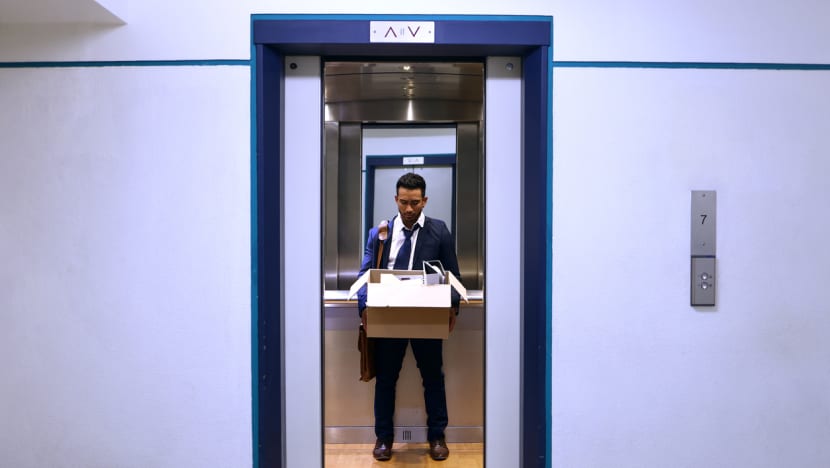Commentary: Survivor’s guilt in the workplace as massive tech job cuts continue
While much of the focus has been on those who have lost their jobs, what companies do for “surviving staff” is also crucial, says psychologist Dr Elizabeth Nair.

File photo. Technology firms laid off 1,270 resident Singapore workers between July and mid-November 2022. (Photo: iStock/PeopleImages)
SINGAPORE: Microsoft cutting 10,000 jobs. Google-parent Alphabet slashing 12,000 of its employees. Amazon.com shedding 18,000 jobs. Salesforce axing 10 per cent of its work force.
January has been a brutal month for tech workers - with job cuts coming rapidly and in big numbers.
In the past month alone, there have been nearly 60,000 tech layoffs, according to Layoffs.fyi, a website that tracks job cuts in the industry.
Spotify on Monday (Jan 23) joined in the carnage, announcing it will shed 6 per cent of its work force.
There are bound to be more layoffs as the tech sector backtracks on its rampant hiring during the pandemic, in anticipation of a looming recession. A top tech analyst has warned that another 15 per cent to 20 per cent of big tech employees could be without jobs over the next six months.
“Ultimately, it keeps coming back to, simply, these companies added too many people too fast,” Gene Munster, managing partner at Deepwater Asset Management told CNBC on Jan 23.
While much of the focus has been on those who have lost their jobs - nearly 160,000 tech employees globally in 2022 - what of those who have survived the cuts?
What are some of the conflicting emotions those who have escaped the cuts feel seeing their colleagues - perhaps some they’ve worked with a long time and developed close bonds with - leave?
SURVIVOR’S GUILT
Survivor's guilt is a common manifestation in the context of war, such as reported in Vietnam war veterans and Holocaust survivors. Guilt is a self-conscious feeling and moral emotion characterised by negative self-evaluation and is a common post-traumatic experience.
Survivor's guilt typically arises in people who have been exposed to, or witnessed death, and have stayed alive, leading to emotional distress and negative self-evaluation. Often, survivors feel responsible for the death or injury of others, even when they had no real power or influence in the situation. Shame also co-exists with guilt in survivors who feel those who died were more deserving of survival.
The survivor syndrome is also seen in accidents, disasters, and tragic incidents.
After the Japan earthquake and tsunami in March 2011, children who narrowly escaped the tsunami started excessively feeding the fish that had survived, resulting in the death of some of the fish. The children were manifesting survivor's guilt of leaving the pets in their care (chickens, rabbits, guinea pigs) behind during the tsunami.
The crowd crush in South Korea during Halloween festivities on Oct 29 last year led to the deaths of 156 people. Untrained bystanders who performed CPR on the Itaewon victims reported feeling psychologically traumatised afterwards.
“PSYCHOLOGICAL CONTRACT”
With the advent of the COVID-19 pandemic, and more recent technological and AI-related upheavals, there has been globally an increasing number of draconian measures in organisational restructuring, re-deployments and staff layoffs.
Understandably, employees have been experiencing a sense of job insecurity, and in many instances believe that the workplace “psychological contract” has also been breached.
Technology firms laid off 1,270 resident Singapore workers between July and mid-November 2022. This is nearly five times the 260 residents laid off in the first half of 2022.
In November, Twitter employees in Singapore told CNA their layoffs were done with “zero empathy”. Those remaining on the payroll were reportedly experiencing “survivor’s guilt”.
On Dec 9, Temasek-backed crypto firm Amber Group said it had "made adjustments dynamically" to its headcount across global offices, without providing specific numbers. Bloomberg reported the firm would cut its work force from the current 700 to less than 400. Days earlier, as rumours swirled, the Singapore-based group declared in several tweets that it was “business as usual”.
On Jan 23 this year, days after Microsoft announced plans to lay off 10,000 workers as part of cost-cutting measures, it announced that it would invest US$10 billion in OpenAI, the company behind chatbot tool ChatGPT.
Workplace psychological contracts are unwritten and non-explicit rules based on behavioural expectations that employers and employees hold of each other. This is not static, and with the hybrid workplace becoming more of a norm with COVID-19 lockdowns and work-from-home measures, the specific details of expectations of workplace behaviours of managers and employees are also in a dynamic state of flux.
Nevertheless, certain fundamental expectations are likely to remain in the workplace psychological contract. This would centre around a sense of fairness or balance in the relationship. Specifics could be to do with transparency, and to be treated with respect.
The feelings expressed by the employment contract terminated staff at Twitter in November are likely also from a sense of breach of workplace psychological contract where they believed they had done their part and their former employer did not.
TOUGHING OUT THE HARD TIMES TOGETHER
Uncertainty during a crisis, such as at the onset and ongoing passage of COVID-19, typically leads to poor performance by inducing anxiety.
Employee organisational identification is a highly prized asset for employers, and is marked by staff loyalty, willingness to take pay cuts when the organisation is under duress, and demonstrated acts of organisational citizenship behaviour such as helping colleagues at work even though it is not part of their job scope.
One positive outcome of COVID-19 associated uncertainties is that it highlighted the similarities of vulnerabilities to the pandemic among employees and thus served to increase their organisational identification.
A positive example in the Singapore context is Singapore Airlines, which underwent drastic staff cuts and re-deployments from September 2020.
As international air travel slowly picked up, re-deployed staff and those who were on no-pay leave, came back on board. Understanding the exigencies of the business challenge, and perhaps good internal communication and a sense of corporate fairness and sound decision-making, may have enhanced employee organisational identification.
In a workplace scenario of widespread change and impending job loss, an increase in active listening can have a ripple effect in employees’ perception of control and decreasing their sense of job insecurity.
Listening can be a more important skill than communicating or presenting. Organisations may do well to train managers in these situations to be better listeners, thereby reducing the detrimental impact of organisational change.
Where massive layoffs have engendered a perception by employees of a breach of the psychological contract of trust and stability, steps taken by employers for “surviving staff” can include being transparent and explicit, and to set clear expectations moving forward.
Dr Elizabeth Nair is CEO, Principal Psychologist and Lead Counsellor, Work & Health Psychologists, Singapore.





















